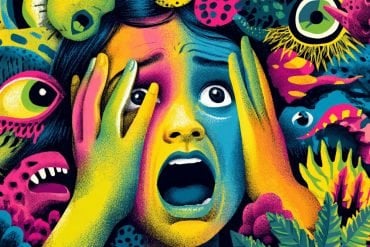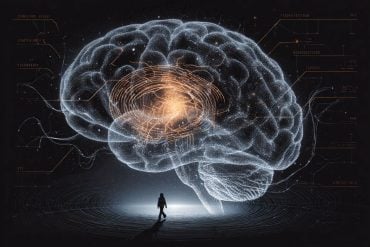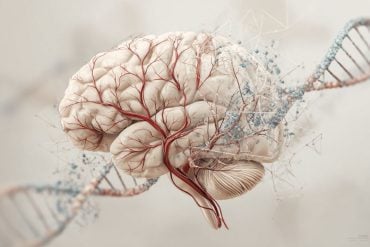Summary: People who express problems in social settings could be at greater risk of both physical and mental health problems, researchers report.
Source: University of Arizona.
Those who struggle in social situations may be at greater risk for mental and physical health problems, according to a new study from the University of Arizona.
That’s because people with poor social skills tend to experience more stress and loneliness, both of which can negatively impact health, said study author Chris Segrin, head of the UA Department of Communication.
The study, published in the journal Health Communication, is among the first to link social skills to physical, not just mental, health.
“We’ve known for a long time that social skills are associated with mental health problems like depression and anxiety,” Segrin said. “But we’ve not known definitively that social skills were also predictive of poorer physical health. Two variables — loneliness and stress — appear to be the glue that bind poor social skills to health. People with poor social skills have high levels of stress and loneliness in their lives.”
The study is based on a survey of a nationally representative sample of 775 people, age 18 to 91, who were asked to respond online to questions designed to measure social skills, stress, loneliness, and mental and physical health.
Social skills refer to the communication skills that allow people to interact effectively and appropriately with others. Segrin focused on four specific indicators of social skills: the ability to provide emotional support to others; self-disclosure, or the ability to share personal information with others; negative assertion skills, or the ability to stand up to unreasonable requests from others; and relationship initiation skills, or the ability to introduce yourself to others and get to know them.
Study participants who had deficits in those skills reported more stress, more loneliness, and poorer overall mental and physical health, Segrin said.
While the negative effects of stress on the body have been known for a long time, loneliness is a more recently recognized health risk factor.
“We started realizing about 15 years ago that loneliness is actually a pretty serious risk for health problems. It’s as serious of a risk as smoking, obesity or eating a high-fat diet with lack of exercise,” Segrin said.
Segrin likens the experience of loneliness to the way people feel when they’re in a hurry to get out the door and can’t find their keys — except the feeling never truly goes away.
“When we lose our keys, 99 percent of the time we find them, the stress goes away, we get in the car and it’s over,” he said. “Lonely people experience that same sort of frantic search — in this case, not for car keys but for meaningful relationships — and they don’t have the ability to escape from that stress. They’re not finding what they’re looking for, and that stress of frantically searching takes a toll on them.”
The good news, Segrin says, is that social skills have proved to be amenable to intervention.
“For people who really want to improve their social skills and work on them, there’s therapy, there’s counseling and there is social skills training,” he said.
Unfortunately, however, many people who have poor social skills don’t realize it, Segrin said.
“One of the problems with possessing poor social skills is lack of social awareness, so even if they’re not getting the date, they’re not getting the job, they’re getting in arguments with co-workers or their spouse, they don’t see themselves as a problem,” Segrin said. “They’re walking around with this health risk factor and they’re not even aware of it.”
Where Do Social Skills Come From?
Social skills are mostly learned over time, beginning in your family of origin and continuing throughout life. Yet, some scientific evidence suggests that certain traits, such as sociability or social anxiousness, may be at least partly hereditary, said Segrin, who has studied social skills for 31 years.
While Segrin doesn’t address it in his current study, he says that technology, for all its benefits, may be taking a serious toll on social skills, especially in young people.
“The use of technology — texting, in particular — is probably one of the biggest impediments for developing social skills in young people today,” he said. “Everything is so condensed and parsed out in sound bites, and that’s not the way that human beings for thousands of years have communicated. It makes young people more timid when they’re face-to-face with others, and they’re not sure what to say what to do. There’s no social interaction, and I fear that’s really hurting young people.”

Parents can help with their children’s social skills — and, in turn, their health — not only by limiting screen time but also by making sure children are regularly exposed to situations that require in-person social interaction, Segrin said.
“It could be a summer camp, a sporting program, a church group — something where they can hang out with peers and just talk and do things together,” he said.
Future research, Segrin said, should explore how other aspects of social skills might impact health. He also is interested in looking at how social skills impact those struggling with chronic illness.
“I want to get the word out about how valuable good communication skills are,” Segrin said. “They will not just benefit you in your social life but they’ll benefit your physical health.”
Source: Alexis Blue – University of Arizona
Publisher: Organized by NeuroscienceNews.com.
Image Source: NeuroscienceNews.com image is in the public domain.
Original Research: Abstract for “Indirect Effects of Social Skills on Health Through Stress and Loneliness” by Chris Segrin in Health Communication. Published online October 20 2017 doi:10.1080/10410236.2017.1384434
[cbtabs][cbtab title=”MLA”]University of Arizona “Poor Social Skills May Be Harmful to Health.” NeuroscienceNews. NeuroscienceNews, 6 November 2017.
<https://neurosciencenews.com/social-skills-health-7887/>.[/cbtab][cbtab title=”APA”]University of Arizona (2017, November 6). Poor Social Skills May Be Harmful to Health. NeuroscienceNews. Retrieved November 6, 2017 from https://neurosciencenews.com/social-skills-health-7887/[/cbtab][cbtab title=”Chicago”]University of Arizona “Poor Social Skills May Be Harmful to Health.” https://neurosciencenews.com/social-skills-health-7887/ (accessed November 6, 2017).[/cbtab][/cbtabs]
Abstract
Indirect Effects of Social Skills on Health Through Stress and Loneliness
The social skills deficit vulnerability model predicts that people with inadequate social skills are at risk for a range of psychosocial problems, especially when confronted with stress. People with poor social skills often experience stress and loneliness and these two constructs were tested as potential pathways by which the poor social skills confer a risk for compromised mental and physical health. An online survey was completed by 775 adults, aged 18–91. The sample matched national demographics for race/ethnicity and age, among those over 18. Structural equation modeling revealed indirect effects of social skills on both mental and physical health through both stress and loneliness. The models showed that poor social skills were associated with poor mental and physical health through elevated stress and increased loneliness. The findings reveal that social skills deficits are associated with physical as well as mental health problems.
“Indirect Effects of Social Skills on Health Through Stress and Loneliness” by Chris Segrin in Health Communication. Published online October 20 2017 doi:10.1080/10410236.2017.1384434







